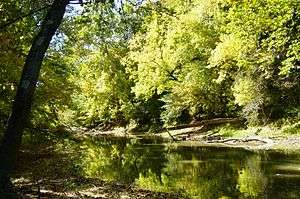Oak Openings Region
The Oak Openings Region is a globally rare ecosystem composed of over 130 square miles (340 km2) of Michigan and Ohio. The land consists largely of oak savanna and grassland prairie. It is considered by The Nature Conservancy as having a similar ecological importance as the Florida Everglades and is one of the 200 "Last Great Places on Earth".

This unique area was formed after the last ice age when the continental glacier melted leaving behind a large lake called Lake Warren. Over time, this lake was gradually reduced to present day Lake Erie and left behind a large tract of sandy soil to the west. The area was frequented by wildfires that only the thick-barked oak trees could survive. When pioneers arrived after first crossing through the Great Black Swamp they called the area the "Oak Openings" as a comparison to the thick swamp.[1]
Today, the Oak Openings Preserve Metropark is the largest intact piece of mostly dry savanna remaining. The largest sections of swamp and savanna, are in the hands of citizens [2] Goll Woods State Nature Preserve also protects a small area of Oak Openings.[3]
References
- Oak Openings Green Ribbon Initiative OakOpenings.org
- Oak Openings MetroParksToledo.com
- Goll Woods Walking Guide OhioDNR.gov. Retrieved 29 March 2016
Further reading
- Grigore, Michelle T (2016). Living in the Oak Openings: a homeowner's guide to one of the world's last great places (PDF) (3rd ed.).
- "Kitty Todd Nature Preserve". The Nature Conservancy.